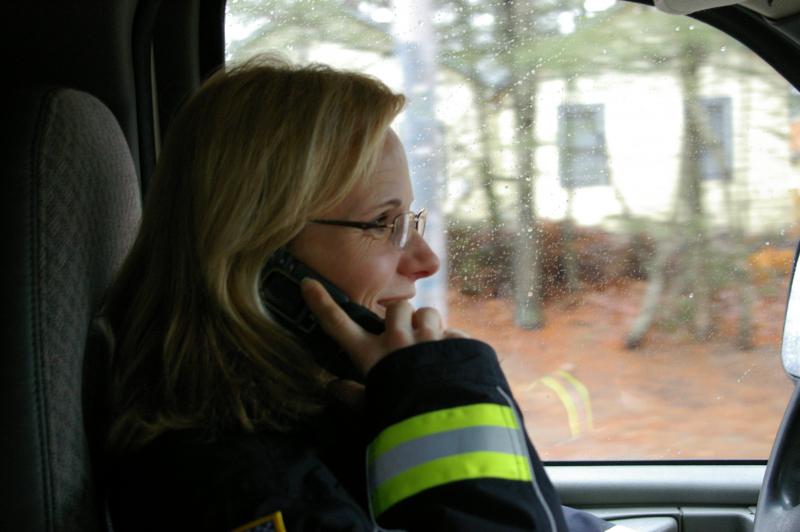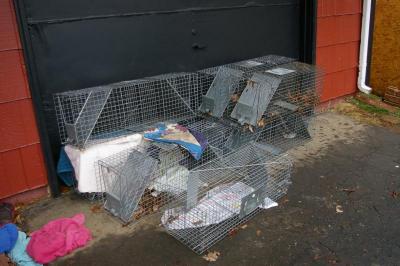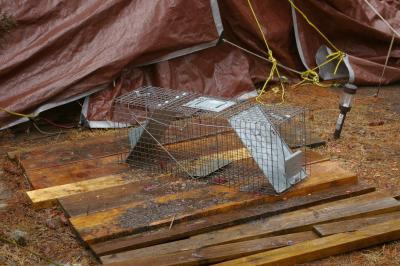Wareham's Animal Control tackles many tasks
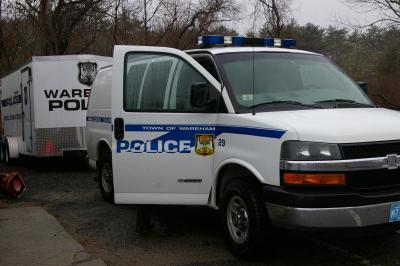

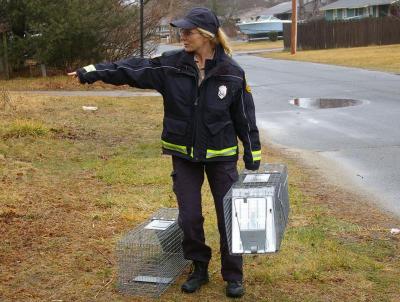
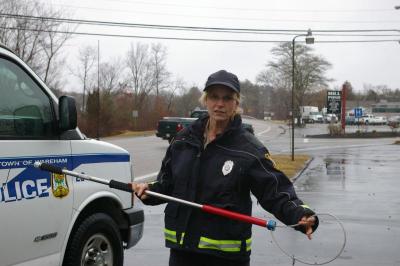
A typical day for Cheryl Gorveatt-Dill, the animal control officer for the town of Wareham, may see her responding to a calls about a dog bite or a rabid skunk, setting up traps for feral cats living in the Cromesett Road area, or even removing a deceased deer that is blocking a road.
"I do a lot of things," explains Gorveatt-Dill, who adds multi-tasking to the list of skill requirements for the job.
So is a combination of a love for animals and a toughness for combat.
That's because responding to a pit bull that is going after another dog in the Indian Mound Beach area of Wareham (a recent event) is no easy task, especially for the 5 foot 5 inch tall and under 120 pound Gorveatt-Dill, who began a weight-lifting regimen when she started working for the Wareham Police Department in the Fall of 2011.
"In the moment, you really don't have time to think, it's instinctual, you don't have time to be afraid," Gorveatt-Dill explained. "A lot of it is improvising and knowing animals. When I was a kid, they used to call me Dr. Dolittle."
Massachusetts has leash laws to prevent dog bites and issues like a loose pit bull from occurring. A dog bite results in an automatic quarantine of 10 days, and a quarantine of 6 months for animals bit by a confirmed rabid animal.
Quarantine can be as simple as not letting the dog off of the household premises, or can be as serious as removing the dog from the household in order to be quarantined elsewhere.
There is a $25 citation for a leashing violation. In addition to the leash laws, however, there are laws for the dog to be licensed and to have had its rabies shot.
Tack on a $50 citation for an unlicensed dog, and another $50 citation for not having a rabies shot, and the citation can add up to $125 dollars.
Licensing and tagging are important so that Gorveatt-Dill can return lost dogs, which would otherwise have to be transported to a shelter until somebody can claim them - a traumatic experience for some domiciled pets - to their owners.
But the primary concern is rabies. A deadly disease, once the clinical signs of rabies appear, the disease is almost always fatal, according to the Centers for Disease Control.
"If you get rabies, if you wait for the symptoms it's really too late," said Gorveatt-Dill during a March 1 interview. "Only a couple of people have survived…so [there's] lots of regulations, if someone gets exposed, they have to get shots, [which are] very expensive and painful."
The risk is not only animals that are exhibiting the confused or disoriented signs of a rabies infection, (or "acting like they're drunk," Gorveatt-Dill said), but also to animals that may be dead or even road kill.
Gorveatt-Dill, who usually picks up 3 or 4 dead animals every day, said that attempting to remove animals that are deceased on the road can potentially expose somebody to rabies. So can another otherwise good intention - trying to help an animal that is suffering.
"If you see a sick animal, don't touch it…animals with rabies often appear to be injured," she said, adding that she usually get 1 call a day for a sick animal.
Rabies is spread through contact with the saliva or brain/nervous system tissue, according to the Centers for Disease Control.
Rabies is also part of the reason why Gorveatt-Dill is trying to get control of the "feral," or wild cats that not only are found throughout Wareham, but also have colonized 4 or 5 Wareham locations, including the Cromesett Road area and Main Street.
Many people will attempt to take care of the cats by feeding them, she explained, which will prompt the cats to return to the area and start congregating.
Very quickly, a few cats will become pregnant, and a large colony will develop all with more cats that need to be fed and sheltered, in addition to being spayed, neutered, and vaccinated against rabies, Gorveatt-Dill said.
Wareham residents are helping her in the feral cat department, however. On the rainy morning of March 1, Gorveatt-Dill got a call from a woman who wanted "Havahart" traps, (pronounced have-a-heart), or cages that safely and humanely trap feral cats.
Gorveatt-Dill dropped them off to the resident, who will call her when a cat is trapped. Cats that are caught will be sent to a humane society and put up for adoption.
Gorveatt-Dill helps in that department as well. She has her own facebook page, "Friends of Wareham Animals," where she puts up pictures of pets that are looking for homes.
"Taking animals that nobody wants" and finding them a home, she said, is the best part of her job.
Marion Animal Hospital will be holding a rabies clinic open to Wareham residents on Sunday, April 22 from 10 a.m. to 1 p.m. The charge will be $15 per animal for a rabies vaccine.



